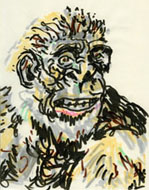|
Informations for volunteers
The natural environment of the
Amazon rainforest is amazingly vivid and manifold. Its unparalleled
biodiversity includes peccaries, macaws, toucans, sloths, jaguars,
monkeys and deer. The region is home to millions insect species, tens
of thousends of plants and invertebrate, over 3500 species of fish and
some 2000 species of birds and mammals. The diversity of plants is the
highest on earth with estimates of over 75,000 types of trees and
150,000 species of higher plants may inhabit one square kilometer alone.
Since life in the jungle is
unique, the information below is designed to provide you with some
basic conditions you should know before coming here. Please read and
consider the following carefully:
Location of Oiyakaha:
Oiyakaha is situated 125km north
of Manaus, Brazil and 250km south of the equator. The nearest
settlement is Jardim Floresta (15km away or half an hour by
car). The nearest town is Presidente Figueiredo (about 35km) and the
nearest city is Manaus (140km / two and a half hours by car). There are
regular bus services between Jardim Foresta and Presidente Figueiredo
or Manaus. Oiyakaha has no car of its own. Getting from or to Oiyakaha
from Jardim Foresta has to be arranged by taxi or mototaxi. Currently
Oiyakaha only has one wooden house of 7 x 4m.
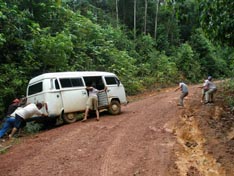 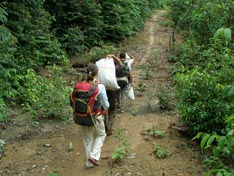 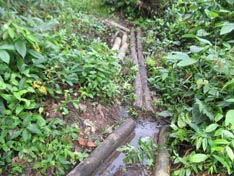 Getting there.... Getting there....
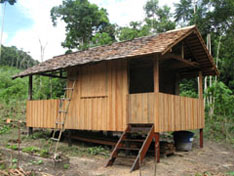 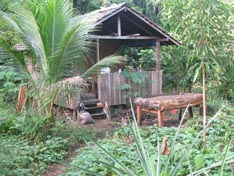 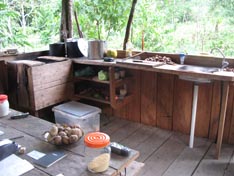 The hut The hut
Living conditions at Oiyakaha are
very basic. This includes the following:
- litte electricity
- no telephone or internet. The closest place to
communicate is Presidente Fiqueiredo. Internet costs around R$2,5 or
US$1,5 / €1 per hour.
- drinking water comes from a fresh water spring on the
property
- personal hygiene and washing your clothes will take
place in the river
- we will sleep in hammocks
   Eaten, sleeping, bathing Eaten, sleeping, bathing
Commintment / Skills:
- we expect you to help about 7 hours a day
- minimum stay is about a month
- the types of work are manly ecological constructions,
agricultural aktivities like planting, harvesting brazil nuts, and
marking trees
- everybody will help with daily chores, such as
cooking and cleaning up
- there are no special skills required, but some apt
hands, common-sence and a love to live a natural and simple life
- it would be good if you speak portugese, since local
people mostly do not speak foreign languages. While with Markus, you
can speak english, german, dutsch, japanese, portugese and spanish.
- please consider Oiyakaha is distant to other
communities and there are few people around.
- Oiyakaha is still in its formation and there is not
always someone around. Please contact us before you come to make sure
there is somebody, you know how to arrive and to inform yourself of the
latest developements and projects.
Things to bring:
- long trousers
- sleeping bag, warm pyjama and clothing (it gets cold
at nights)
- brush, rough washcloth or loofah to clean yourself
- rainboots and coats (good rainboots can be purchased
locally)
- flashlight
- hat (also available locally)
- air-tight tupper-box to stuff your electronics and
any other belongings which you want to have protected from humidity and
water
- pocket knife might be useful
To preserve the pristine condition
of the natural environment, please note the following principles on
Oiyakaha:
- no use of soap to wash yourself or cloths. *read the
abstract "Soap is not good for you" below
- refrain from using mineral oil based creams
- avoid non-organic waste as every piece has to be
taken back and deposited of in the city
- no smoking
Environmental conditions:
- the sun rises around 6:00 and sets at 18:00
- the average year-round daily air temperatures is
30°C
- rainy season is from December until May, during which
it rains almost once every day.
- relative humidity of the air is over 90%. Anything
can grow mold, including photographic equipment. (There are way to
prevent this)
- there are no mosquito's during the daytime. Very
rarely, a few mosquito's (one or two) appear at night.
- Malaria and dengue fever are potential hazards in the
entire Amazon. There is no vaccine for either. You can take pills
preventively against malaria, which have strong side effects (read the
medical precautions). I recommend homeopathic medicine like quinine or
herbs like artemisia annua against malaria. Both Presidente Figueiredo
and Jardin Floresta are known to have few to no cases of malaria and
dengue. Medical services in Presidente Figueiredo are fairly good and
free of charge. For detailed information on dengue or malaria you can
search wikipedia.org online.
- following vaccinations are recommends for Brazil:
Yellow fever, Tetanus, Diphtheria and Hepatitis A. For stays longer
than four weeks, these vaccinations are also recommended Hepatitis B,
Rabies and Typhus. Please check your local medicalauthorities for
accurate and updated information.
- you will get bitten or stung by ticks and ants.
However, neither transmit disease.
- there are dangerous animals like: poisonous serpents,
jaguars, tarantulas and wasps. No animal attacks humans when
unprovoked; they will only attack as a last resort when feeling
threatened. Leopards are very shy and keep away from human presence.
- orientation in the forest is difficult and one can
lose one’s way easily. Vegetation limits depth of sight and
things look very similar.
Disclaimer: After having read the
above, please also consider the following. People have lived, and
continue to live, in the Amazons for millennia in consort with nature.
The rainforest may be overwhelming at first, and the list of dangers
staggering, but the same goes for the urban jungle. City life includes
hazards like traffic accidents, mugging, exhaust fumes, electromagnetic
radiation and an endless list of carcinogenic substances.
*Soap is not good for you
Today we have a wide variety of
soaps for diverse kinds of applications. They not only wash various
body parts but also different skin or hair types, treat acne or
dandruff, kill bacteria and germs or wash off cosmetics. Soap is
growing out of its original purpose of a simple cleaning agent into
being a source of general well-being and self-appreciation. On the
wrappings are written auspicious promises like: stimulation,
revitalization, purification, relaxation or nourishing balsam. Still
your well-being and that of your skin and hair is much better off
without their aspirations. The following are a sample of reasons why
your personal hygiene shouldn't be done with soaps:
a) curd soaps are not pH neutral and offset the pH balance of the skin.
The skin takes 24 hours to recover the balance of its acid mantel. The
acid mantel is a barrier to bacteria, viruses and other potential
contaminants that might penetrate the skin.
b) curd soaps and especially liquid soaps contain tensides. These too
disturb the acid mantel and remove lipids in the skin, increasing the
penetrability and decreasing the skin protection against the
environment. Conventional tensides also can enter the skin and stay
there after the washing process. This can cause long term skin
irritations.
c) There are lot’s of scary ingredients in soaps and
cosmetics: e.g. some tensides are made form war gasses like
polyethylengykol = PEG, or Polypropylglykol = PPG, there is also
Copolyol, Polyglykol, Polysorbate. Conventional creams contain
petroleum and its derivates in it too.
Concerning the use of soap for feminine hygiene, the same is applicable
as mentioned above. Healthy skin can protect itself against bacteria or
germs. It does its job best, without the interference by cosmetics or
soaps which disrupt its very protective mechanism: the acid mantel.
Anti-bacterial soaps can be very potent, but after its short-lived
effect wears off, the skin is left defenseless.
At least until a hundred years ago and still today plenty of women do
not use soap for their hygiene. It is reasonable to believe any
contemporary women can do the same and live healthy without the use of
soap. Complementary, men can do without soap, too. Shaving goes
perfectly using vegetable oil instead of soap.
Hair and skin care is best done by using a brush and comb. This not
only helps to clean your self and keep your hair smooth, but also
increases blood circulation in the skin, stimulates the expulsion of
toxic’s and prevents cellulitis. Additionally most
defilements like mud and sweat is water based and thus easily cleansed
by water. Greasy dirt can be tackled with hot water or through
mechanical means like scrubbing. Only in rare cases the use of soap
makes sense.
This abstract has been greatly influenced by the following book:
Kehrbusch, Susanne: Haut und Haar, emu Verlag, 2.
Auflage 2002 (Skin and Hair, emu publisher, 2nd
edition 2002)
|
